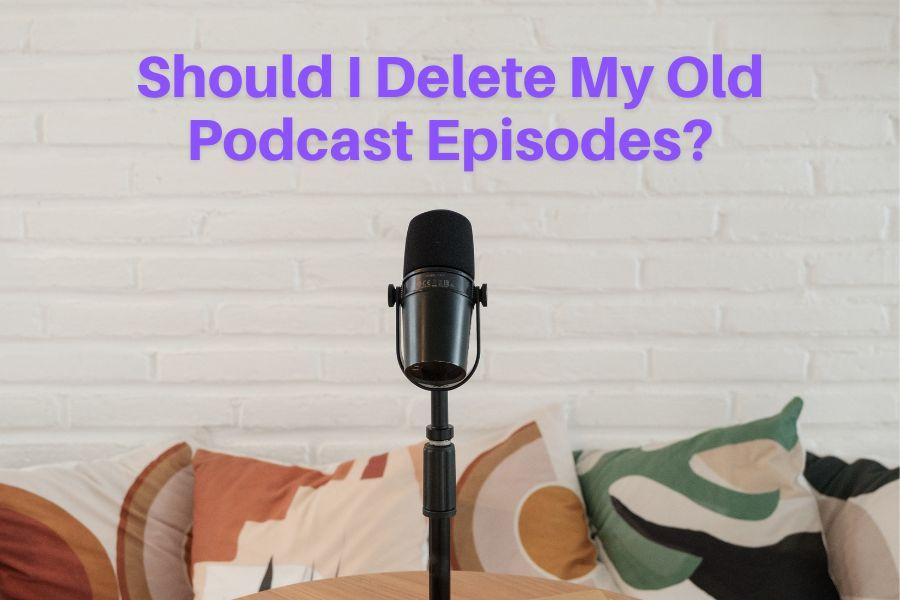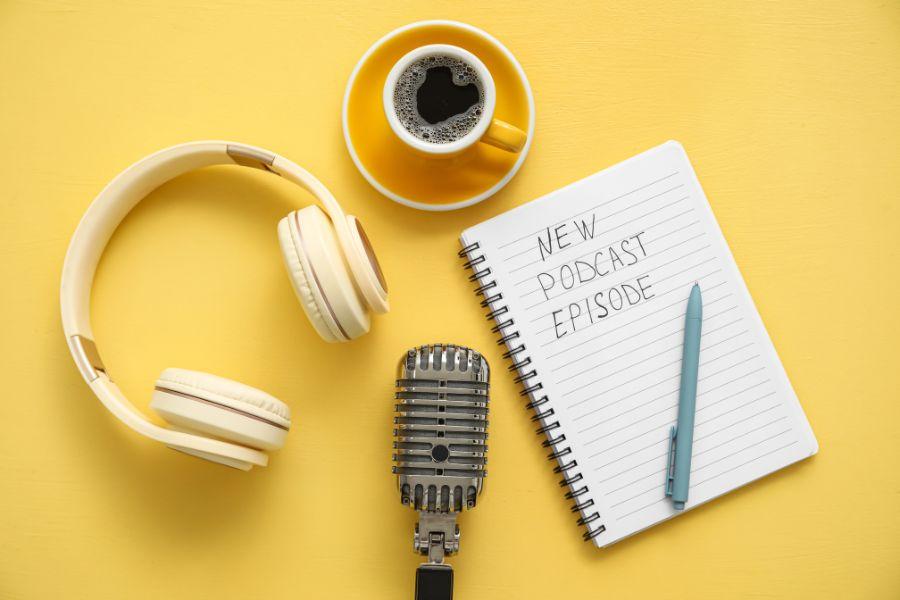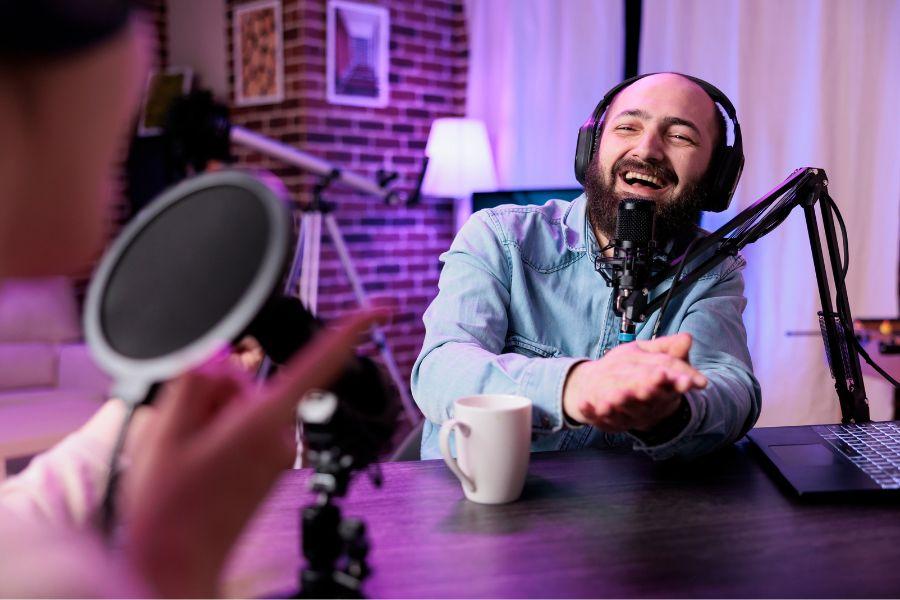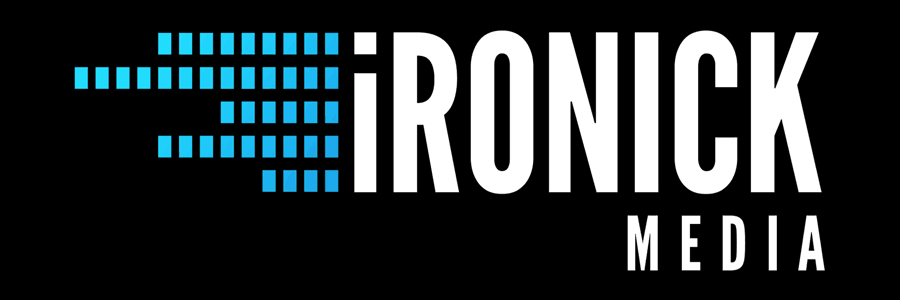
12 May Should I Delete My Old Podcast Episodes? A Complete Guide for Established Podcasters
Deleting old podcast episodes might seem like a way to present a more polished image, but it comes with significant tradeoffs in discoverability, audience growth, and content strategy.
As experienced podcasters, we’ve all felt that cringe when listening back to our early work—those awkward pauses, audio quality issues, and less refined hosting skills. If you’ve been podcasting for a while and have refined your craft, you might be questioning whether those earlier, less polished episodes still deserve a place in your feed.
Throughout this guide, we’ll explore the pros and cons of keeping your full catalog intact, strategic alternatives to deletion, and provide a framework for making this important content decision.
Note: Quotes and thoughts will attributed to guests and discussion from the Podcasting Morning Chat.
The Podcaster’s Dilemma: Why We Consider Deleting Old Episodes
Podcasters consider deleting old episodes because they often no longer represent our current quality standards, content focus, or professional brand image.
That feeling of wanting to erase past work isn’t unique to podcasting—it’s a natural reaction many creators experience as they evolve. For established podcasters who have hit their stride with hundreds of episodes under their belt, those first dozen or so recordings can feel like evidence of amateur beginnings you’d rather not showcase.
The urge to delete typically comes from three primary concerns:
- Quality disparities between old and new content
- Shifts in content strategy or brand positioning
- Fear of negative judgments from potential sponsors, networks, or new listeners
This sentiment resonates with many of us who’ve been in the podcasting game long enough to see significant improvement in our work. But before you hit that delete button, let’s examine what you might lose in the process.
Understanding the Value of Your Podcast Journey

Your podcast catalog tells the story of your evolution as a creator, providing authentic documentation of your growth that can be surprisingly valuable to your audience.
Those early episodes represent the foundation upon which you’ve built your current success. They’re timestamps of your podcasting journey that show listeners the real person behind the microphone.
As podcast producer Ashley Feller notes, “I think you’re giving your audience a gift by showing them your trajectory and the progression of where you started to where you are now. And I think that people are a little more forgiving than we give them credit for.”
This perspective challenges us to reconsider what we see as “cringe-worthy.” What feels uncomfortable to you might actually humanize you to listeners who:
- Are just starting their own podcasting journey and need to see realistic beginnings
- Connect with the authenticity of your learning process
- Appreciate seeing the evolution of production quality and hosting skills
Your podcast’s growth parallels the journey of every successful creative endeavor. Much like how iconic musicians don’t hide their early demos or how renowned authors keep their first books in circulation, your complete body of work tells a more compelling story than a curated highlight reel.
The Potential Benefits of Keeping Old Episodes
Keeping your complete episode catalog intact provides cumulative SEO benefits, preserves download statistics, and serves the subset of superfans who consume your entire content library.
While it might be tempting to present only your most polished work, there are tangible advantages to maintaining your full episode history.
From a technical standpoint, these benefits include:
- Maintaining cumulative download numbers: Removing episodes means losing the statistics associated with them, which can impact your overall metrics when approaching sponsors.
- Preserving SEO juice: Each episode creates discoverability pathways through search engines and podcast platforms.
- Providing entry points: Older content on evergreen topics continues to serve as discovery opportunities.
As podcast host Jonathan Howard noted, “Episode one is still getting a significant number of views still. People do go back and listen.” This observation challenges the assumption that older content simply gathers digital dust.
Beyond the metrics, there’s also the superfan factor to consider. While casual listeners may only engage with recent episodes, your most dedicated fans often consume your entire catalog. These superfans typically represent your most engaged audience segment—the listeners who become Patreon supporters, attend live events, and recommend your show to others.
When Removing Episodes Might Make Sense
Removing podcast episodes makes sense when they contain factually incorrect information, feature guests you no longer align with, or include content that could genuinely harm your professional opportunities.
While we generally advocate keeping your catalog intact, there are legitimate circumstances where deletion or archiving might be the right choice.
Consider these scenarios where removal might be warranted:
- Content featuring individuals with whom you’ve had significant falling outs or legal disputes
- Episodes with information that’s not just outdated but potentially harmful if followed
- Content that no longer represents your core values or brand position
- Interviews with guests who have since been involved in serious controversies
Podcast host Sid Meadows shared his experience: “The episode that I took down, I did not permanently delete them. I just removed it from the RSS feed and removed it from my website… The reason I’ve taken those episodes down is I no longer want to support those people.”
This nuanced approach—hiding rather than permanently deleting—preserves the content while removing it from public circulation, giving you flexibility if circumstances change later.
How Sponsors and Networks Actually Evaluate Your Podcast
Sponsors and networks primarily evaluate your podcast based on recent content quality, current audience metrics, and growth trajectory—not your earliest episodes.
This insight might be the most reassuring for podcasters concerned about professional opportunities being limited by their early work.
Industry professionals typically focus on:
- Your most recent 5-10 episodes for content quality assessment
- Download statistics from the past 30-90 days
- Audience demographics and engagement metrics
- Growth trajectory rather than absolute numbers
As podcast industry veteran Billy Thorpe explains: “If you are just solely relying on your analytics and your show’s catalog to sell sponsorship deals, you’re leaving so much money on the table… I had our show sponsored at episode five. It wasn’t because we had a great show or a lot of people listening. It was because we understood the value of what we were going to accomplish.”
Think of how recruiters approach hiring: they don’t evaluate professional athletes based on their peewee league performances or judge executives by their first high school job. Similarly, podcast networks and sponsors care about who you are now and where you’re headed—not where you started.
The SEO Impact of Deleting Podcast Episodes
Deleting podcast episodes can negatively impact your show’s SEO performance by reducing the number of indexable pages, removing established keyword rankings, and eliminating valuable backlinks to your content.
The search engine optimization implications of content deletion extend beyond just your website to affect how podcast platforms recommend your show.
Each podcast episode creates multiple digital touchpoints:
- A dedicated page on your website
- An entry in podcast directories (Apple Podcasts, Spotify, etc.)
- Social media posts and possible embeds on other sites
- Potential backlinks from other websites
When you delete an episode, you lose all the accumulated SEO value these touchpoints have generated. Podcast platforms and search engines use this collective data to determine your show’s relevance and authority.
Marc Ronick notes: “Strategic content management can improve overall show discoverability.” This insight reminds us that content decisions should align with broader visibility goals, not just aesthetic preferences.
For podcasts with established episodes that receive consistent traffic or maintain strong keyword rankings, deletion represents a tangible loss in discoverability—potentially limiting how new listeners find your show.
Strategic Alternatives to Deletion

Strategic alternatives to deleting old episodes include creating separate “archive” sections on your website, reorganizing content into themed collections, and using clear categorization to guide new listeners toward your best work.
These approaches preserve your content library while addressing concerns about presentation.
Consider these practical alternatives:
- Website reorganization: Create an “archive” or “early episodes” section on your website that separates older content from your featured episodes.
- Playlist curation: Build themed collections that mix older and newer episodes based on topics rather than chronology.
- Strategic categorization: Use podcast apps’ season functionality to organize content phases.
Podcast producer Nick Knalbach shared his approach: “We’ve moved older episodes to a secondary page on my website, and it says legacy episodes or something like that… I think it could clean up things a little bit and make it easier to find things.”
This middle-ground strategy maintains the benefits of keeping your complete catalog while addressing presentation concerns. Listeners who want to explore your full library can easily do so, while new visitors can be guided toward your strongest content.
The Smart Way to Update Outdated Episodes
Updating outdated episodes by appending show notes, adding audio disclaimers, or replacing the audio file while maintaining the original URL preserves SEO benefits while improving content quality.
Rather than deleting problematic episodes, consider these enhancement strategies.
For episodes with outdated information, implement these tactics:
- Add a clear disclaimer at the beginning: Record a short intro acknowledging the episode’s age and noting any significant updates.
- Append show notes: Add updated information to the episode description without removing the original text.
- Replace audio while maintaining the URL: Many hosting platforms (like Libsyn and Blubrry) allow you to replace the audio file without changing the episode’s URL or losing statistics.
As Marc Ronick advises: “Instead of deleting or changing things in the description or title, make an effort to append any type of text into the show notes that will show up in Apple Podcasts and your blog post. The idea is to keep the original text that you wrote because that text might be the perfect combination of search engine optimization (SEO) that the Google algorithm or Apple Podcasts algorithm is recommending.”
This approach gives you the best of both worlds—maintaining the SEO and statistical benefits of established episodes while ensuring the content remains accurate and representative of your current standards.
Building a Media Kit to Highlight Your Best Work
Media kits allow podcasters to highlight their best work for sponsors and networks without deleting older content, effectively curating a professional presentation while maintaining a complete catalog.
This strategic tool addresses one of the primary concerns podcasters have about keeping older episodes—how they’ll be perceived by industry professionals.
An effective podcast media kit should include:
- Best episode showcase: A curated playlist of 5-7 episodes that represent your strongest content
- Audience demographics: Detailed information about who listens to your show
- Download statistics: Growth trends and engagement metrics
- Content themes: Clear articulation of your podcast’s focus and value proposition
As podcast producer Ashley Feller suggests: “If presentation to sponsors is such a concern, perhaps consider including an electronic press kit, some people call it a media kit, on your website with the intention of this is for the sponsors to see. So when you pitch to sponsors, you link them directly to this page on your website.”
This approach puts you in control of first impressions while maintaining the benefits of your complete episode catalog. Industry professionals rarely have time to dig through your entire feed—they’ll likely focus on the content you specifically highlight.
Balancing Personal Growth with Content Strategy
Podcasters must balance personal feelings about early work with objective content strategy decisions by recognizing that self-criticism is often harsher than audience judgment.
The psychological aspect of content creation often leads us to judge our work more harshly than others do.
To develop a healthier relationship with your early content:
- Reframe “cringe” as growth: View those early episodes as evidence of your commitment to improvement
- Separate emotional reactions from strategic decisions: Evaluate content based on data and audience feedback, not just personal feelings
- Embrace imperfection as authenticity: Recognize that polish isn’t always synonymous with connection
As podcaster Yvonne shares: “I wanna keep the cringe up. I am because that’s what I’m doing with my podcast is and that’s what I do on social media is show my cringe. I’m showing my process because it’s part of my message is, you know, get in there and be a beginner and make the mistakes.”
This perspective invites us to consider how our “imperfect” content might actually serve listeners in ways our polished work cannot—by giving permission to begin, to learn publicly, and to embrace the messy middle of any creative endeavor.
Leveraging Your Back Catalog for Growth
Your podcast’s back catalog can be strategically leveraged through content repurposing, retrospective features, and cross-episode references to drive engagement with your full library. Rather than viewing older episodes as liabilities, consider them assets in your content strategy.
Try these approaches to maximize the value of your complete catalog:
- Create “then and now” features: Highlight your growth by comparing early and recent episodes on similar topics
- Build topical compilations: Curate theme-based collections that include episodes from various periods
- Reference older content: Link to relevant past episodes in your show notes for newer releases
- Repurpose content: Extract clips from older episodes for social media content, showcasing valuable insights regardless of production quality
The key is to approach your back catalog as a resource library rather than a chronological timeline. By organizing content thematically and highlighting valuable insights across your podcasting journey, you transform perceived weaknesses into strategic assets.
As one podcaster notes: “Strategic content management can improve overall show discoverability.” This mindset shifts the focus from hiding what you perceive as flaws to maximizing the utility of everything you’ve created.
What Your Listeners Really Think About Your Old Episodes

Listeners tend to be more forgiving of early production quality issues than creators expect, often valuing content substance and authenticity over technical perfection.
The gap between how we perceive our work and how audiences experience it is often substantial.
Consider these insights about listener behavior:
- Discovery patterns vary: Some listeners start with your most recent episode, while others begin from episode one
- Content trumps production: Valuable insights in less polished packages still provide listener value
- Authenticity builds connection: Hearing your evolution can strengthen audience relationship
- Superfans appreciate the journey: Your most dedicated listeners often enjoy witnessing your growth
As podcast host Michael observes: “I think there’s a lot of people that always wanna start a story at the beginning. And they look at a podcast like a story.” This insight suggests that for many listeners, experiencing your complete journey is part of what builds connection to your show.
Remember that what feels painfully obvious to you as the creator—the awkward pauses, audio issues, or less refined delivery—often goes unnoticed by listeners who are primarily focused on your content’s value rather than its packaging.
Making the Final Decision: A Strategic Framework
Making the final decision about keeping or removing old episodes should involve a systematic content audit, clear evaluation criteria, and alignment with your podcast’s long-term goals.
To move beyond subjective feelings and toward strategic action, follow this framework:
- Conduct a content audit: Review your complete episode catalog with these questions:
- Does this episode provide unique value to listeners?
- Does it contain substantially outdated or incorrect information?
- Does it align with my current brand and content direction?
- Does it receive ongoing traffic or engagement?
- Establish clear criteria: Create specific thresholds for potential removal, such as:
- Episodes with demonstrably incorrect information
- Content featuring individuals or organizations you no longer support
- Episodes with technical issues that significantly impact listenability
- Consider alternative approaches: For borderline cases, explore options like:
- Adding disclaimer introductions
- Moving content to an archive section
- Updating show notes with current information
- Re-recording with improved quality while maintaining the core content
As Marc Ronick advises: “If that’s her choice, so be it. But I am definitely in the camp. Just keep it up there. Stop worrying about it. And if anything, you’re catering to your super fans who want that content.”
This balanced approach ensures that your decisions are guided by strategic considerations rather than momentary insecurities about your creative journey.
Expert Voices: What Successful Podcasters Say About Their Early Work
Successful podcasters overwhelmingly maintain their early episodes despite quality disparities, recognizing that content completeness builds audience trust and documents their authentic journey. Looking to industry leaders provides valuable perspective on this common dilemma.
Here’s what established podcasters have shared about managing their catalogs:
- Joe Rogan (The Joe Rogan Experience): Maintains all episodes despite the dramatic evolution in production quality and interview style.
- Pat Flynn (Smart Passive Income): Keeps his complete catalog available, occasionally referencing early episodes to show his progression.
- Marc Ronick (iRonick Media): “I have listeners… to this day, will send me a note saying, ‘Oh, I just finished going through all of your episodes for the fourth time.'”
- Ashley Feller: “Just remember that that first episode, that first handful of episodes is a symbol of you had to start somewhere. When you think about plants, they start from seeds.”
The consensus among podcast veterans is clear: your complete body of work tells a more compelling story than a curated highlight reel. As Billy Thorpe colorfully puts it: “Michael Jordan doesn’t go back and delete every missed shot or flunked dunk.”
For most successful podcasters, the journey—complete with its awkward beginnings—is an essential part of their show’s story and connection with listeners. Your evolution isn’t something to hide; it’s something to celebrate as evidence of your commitment to continuous improvement.
Make the Best Choice for Your Podcast
Ultimately, the decision about whether to delete old podcast episodes is yours to make based on your specific circumstances and goals. However, the collective wisdom from industry professionals suggests that in most cases, the benefits of maintaining your complete catalog outweigh the temporary discomfort of keeping less polished work visible.
By implementing strategic alternatives like media kits, content reorganization, and thoughtful updates, you can address legitimate concerns while preserving the authentic record of your podcasting journey.
Remember that what feels like “cringe” to you often translates as “authentic” to your audience. Your willingness to keep your complete journey visible doesn’t just preserve SEO benefits and download statistics—it communicates honesty, transparency, and confidence in your evolution as a creator.
Want the best tips and strategies to grow your podcast?
Discover how iRonick Media can assist in growing your podcast today.
